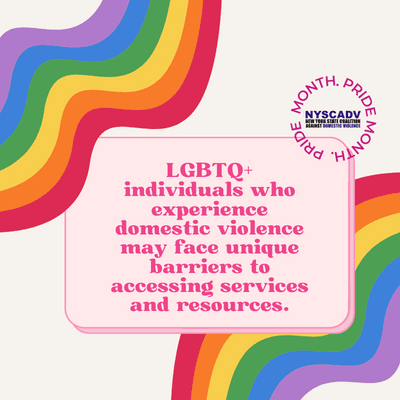
June is Pride month, a month dedicated to celebrating and uplifting the LGBTQ+ community. Pride month symbolizes an opportunity to reflect on program policies and procedures for working with LGBTQ survivors of domestic violence while building on past efforts to create more inclusive spaces and affirming services for all survivors.
Pride month is also a reminder of progress in the fight for equality. From Stonewall to the Supreme Court, the LGBTQIA+ community has and continues to organize, campaign, and mobilize to not only change policies but ensure that every LGBTQIA+ person can lead true and authentic lives.
While visibility for LGBTQIA+ people is at an all time high, so are state-led attacks on LGBTQIA+ rights. State houses across the country are weaponizing public policy restricting LGBTQIA+ rights. In 2023 alone, over 520 anti-LGBTQIA+ bills have been introduced in state legislatures, over 220 specifically targeting transgender and nonbinary people. 47 of these LGBTQIA+ erasure laws have been enacted.
We must recognize that the LGBTQIA+ community experiences domestic violence at rates equal to or higher than their straight peers. Yet only one in five survivors of same-gender sexual assault and/or domestic violence received victim services. One of the most significant barriers to accessing services is the lack of affirming services. Additionally, LGBTQIA+ survivors face isolation, lack of visibility, lack of support, internalized stigma, fear, safety concerns, and denial of services including shelter. 46% of TGNC survivors felt uncomfortable seeking help from law enforcement and 28% have postponed victim services due to fear of discrimination. There’s work to be done- but where to start?
There’s no better time than the present.
Whether your agency has a long-standing history of authentically serving LGBTQIA+ survivors or is just starting on this journey, here are a few resources to be celebrated this Pride month.
Live resource(s):
Supporting LGBTQ Survivors of Domestic Violence (National LGBTQ Institute on Intimate Partner Violence)
This 2-hour interactive workshop is designed to equip domestic violence service providers with essential information on the unique and specific experiences of LGBTQ survivors of IPV. Participants will leave with increased knowledge of core best practices for providing culturally responsive services to LGBTQ individuals and tools and strategies for reducing barriers and providing intentional support around unique challenges that LGBTQ survivors face. July 27 at 12pm. Register here.
Other resources:
LGBTQ2S+ Glossary of Terms (Coalition to Stop Violence Against Native Women)
Supporting LGBTQ+ Stalking Victims: A Guide for Advocates (SPARC and Forge)
This guide is for victim advocates working with lesbian, gay, bisexual, transgender, and queer (LGBTQ+) individuals who may be experiencing stalking. It provides basic information about the dynamics of stalking and safety planning, co-occurring crimes, specific tactics used against LGBTQ+ individuals, safety planning strategies that support LGBTQ+ stalking victims, and issues to be aware of when supporting LGBTQ+ victims.
Community Action Toolkit for Addressing IPV Against Transgender People (The National Coalition of Anti-Violence Programs)
This toolkit was designed to provide communities with strategies to create dialogue on transgender intimate partner violence, ways to support survivors, and identify resources for intimate partner violence.
Toolkit for Increasing Shelter Access to LGBTQ Survivors (The National LGBTQ Institute on Intimate Partner Violence)


